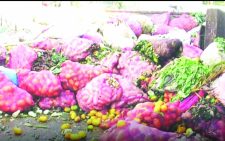New food policy priorities in rapidly changing world

Climate change and other compelling factors have forced scientists and agricultural experts to develop new policies to drive much-needed transformation in food systems.
With global warming accelerating, conflict escalating and aid shrinking, governments need clear evidence to navigate tough choices for food security, especially in Africa, where smallholder farmers are central in the formulation of these new policies.
Recent reductions in development funding from the US and Europe have intensified scrutiny of aid, as more than 700 million people, the majority in Africa, continue to grow hungry every day – a crisis compounded by climate change, economic volatility and geopolitical shocks.
During the United Nations Ocean Conference, which ends today in Nice, France, the world’s key institutions on matters related to agriculture, fisheries and aquaculture extensively discussed these issues and unveiled new strategies to address them.
The Consortium of International Agricultural Research Centres (CGIAR), a global partnership of organisations working together to research food security, and the International Food Policy Research Institute (IFPRI), marking its 50th anniversary, presented two recently released reports at the conference.
In an op-ed, CGIAR Executive Managing Director Ismahane Elouafi says governments, particularly in developing countries, face a perfect storm.
Practical pathways
“Dwindling finances alongside growing pressure to ensure sustainable food security, and navigating this storm demands clear, science-based evidence to help policy-makers make smart, localized decisions that make the most of increasingly limited resources”.
Elouafi, a former chief scientist at the UN’s Food and Agriculture Organisation (FAO) notes that while a wealth of scientific research already exists on the innovations that address hunger and poverty sustainably, governments often face challenges integrating these into national policies and programmes.
“What has been missing is a practical, accessible guide – a bridge between science and action – that outlines proven solutions to specific, on-the-ground challenges. This is what a new CGIAR Insight to Impact: A Decision-Maker’s Guide to Navigating Food System Science, CGIAR’s inaugural flagship report seeks to deliver.” she says.
Compiling decades of agricultural research into actionable proposals Insight to Impact delivers actionable recommendations and solutions for decision-makers. Rooted in deep engagement with global experts, decades of CGIAR, partner science, it offers clear pathways to transform food, land, and water systems.
A result of CGIAR’s commitment to continually improving the accessibility and relevance of its research to decision-makers, the report is not another set of documents filled with jargon and statistics, it notes in its introduction.
Designed for leaders, policymakers and researchers, it focuses on translating science into action. The Insight to Impact report simplifies scientific findings into practical, understandable, and relevant information with links to tools and real-world applications.
It is the first in a series that will deliver plain-language roadmaps to help decision-makers tackle complex food and nutrition security, and sustainability challenges.
IFPRI’s 2025 Global Food Policy Report, Food Policy—Lessons and Priorities for a Changing World, reflects 50 years of progress and examines priorities for food policy research in the run-up to 2050.
It is a comprehensive reflection of five decades of food policy evolution and a call to action for a research agenda that meets the demands of the next generation. The report is co-edited by IFPRI Director-General Johan Swinnen, and Christopher Barret, Stephen B. and Janice G. Ashley, professor of Applied Economics and Management, Cornell University, and chair of IFPRI’s Strategy and Programme Council.
Food Policy—Lessons and Priorities for a Changing World highlights how food systems have transformed dramatically since IFPRI’s founding in 1975 – from the early days of the Green Revolution to today’s complex challenges driven by climate change, rising inequality, persistent hunger, and rapid technological innovation.
Drawing from IFPRI’s own extensive research and that of its global, national, and local partners, the report provides a long-view analysis of policy’s role in shaping healthier, more equitable, resilient, and sustainable food systems.
“The report is both a retrospective and a roadmap,” says Swinnen, “It looks back to understand how far we’ve come and looks ahead to identify the critical priorities for policy research to help navigate today’s pressing food challenges.”
Elouafi concurs, noting that policies play a critical role in the fight against hunger and malnutrition, and that innovations cannot scale without and enabling policy environment.
New challenges
“For the past 50 years, IFPRI has worked closely with partners around the world to generate vital evidence that informs policy decisions and frameworks to address these challenges while also fostering a more integrated management of water, energy, food and environmental systems,” Elouafi says.
The 21st century has brought new hurdles such as more frequent climate shocks, rising conflicts, growing inequality, persistent malnutrition in all its forms—all slowing previous progress on reducing hunger and poverty.
The IFPRI report traces how IFPRI and the broader policy research community have responded to—and often anticipated—these shifts by expanding the scope of research from agricultural production to agri-food value chains, and entire food systems, including processes that influence nutrition, food, health, sustainability, community development, and agriculture.
IFPRI has defined six broad priorities for a food policy research agenda for the future that includes strengthening resilience and inclusion in food systems everywhere, improving diets and nutrition, harnessing new technologies responsibly, engaging the private sector, mobilising and reforming existing pubic spending, and fostering inter-disciplinary research and policymaking.
CGIAR has adopted four approaches to help the world’s 30 million smallholder farmers adapt to climate change by 2030.
The first is to reduce risk to farming systems at scale through digital agro-climate services, implementation of climate-resilient practices and the diversification of production systems to reduce negative climate and nutritional impacts on farmers.
The second is to build production-system resilience through studying the relationships between climate, agriculture, security and peace. Donors realise that climate is a “threat multiplier” as it can exacerbate problems such as conflict.
This work will enhance climate-resilience peace by designing evidence-based environmental, political and gender-equitable solutions through participatory, bottom-up community actions.
The third approach is to develop adaptation instruments for policy and investment, focusing on the inclusion of women, youth and other marginalised groups. Fourth is to build the capacity of local governance to implement transformative adaptation, with local communities’ critical partners in organising, learning all the activities with an emphasis on how these align to – or can be adapted to – cultural norms.
Strengthening the climate resilience of smallholder farmers is a priority. Growth in agriculture is needed to meet nutrition and food security demands both today and in the future. The climate crisis is one of the primary obstacles to meeting these needs.
A cohesive global strategy is crucial to meeting the climate goals and agreements. CGIAR emphasizes the importance of enhancing institutional alignment, refining financing frameworks, and expanding technic al assistance to support country-led adaptation plans and investment pipelines.
Strategic partnerships can strengthen governance and facilitate the use of technical cooperation platforms, streamlining efforts across food, land and water systems. By prioritising coordinated action, CGIR seeks to empower smallholder farmers, enhance resilience, and contribute to a sustainable transformation of food systems in line with the Paris Agreement.















